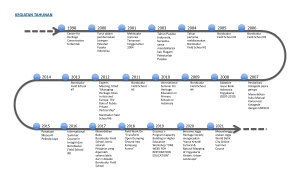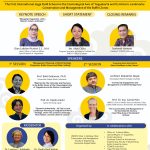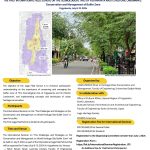Background
Three decades ago, the practice of conserving natural and cultural heritage related to architecture, regions, villages, cities and landscapes in Indonesia, as well as in Southeast Asia is still in the early stages of development. In addition, heritage education programs in this region are still limited. Several architectural study programs have offered formal education and heritage conservation training, but in general they are still elective subjects. Based on this argument, in 1998, the Center for Heritage Conservation (CHC-UGM) was established at the Department of Architecture and Planning, Faculty of Engineering, Universitas Gadjah Mada, Yogyakarta Indonesia.
It started as an interest group in the conservation of architecture and the city. CHC-UGM, in addition to improve learning materials for heritage conservation through research and conservation practices, is also active in community service. In 2000, CHC-UGM became the secretariat of the Indonesian Heritage Conservation Network (Jaringan Pelestari Pusaka Indonesia), which was established by various heritage conservation organizations in Indonesia. In 2003, CHC-UGM also became the secretariat for the implementation of the 2003 Indonesian Heritage Year. This is a grand event that was held for the first time in Indonesia. Meanwhile, the first charter in the field of heritage conservation, namely the 2003 Indonesian Heritage Conservation Charter was launched. In 2004, along with various heritage conservation organizations in Indonesia, CHC-UGM has participated to establish the Indonesian Heritage Conservation Network to become the Indonesian Heritage Trust, which is a legal institution and located in the capital of Indonesia. Until now, various local, national and international heritage conservation activities have sustainably been organized at CHC-UGM. The results are not mainly utilized for the learning materials, but also to encourage the improvement of the comprehensive heritage conservation practices in Indonesia, as well as being able to contribute fostering of the Sustainable Development Goals (SDG’s).
With the establishment of the Engineering Research and Innovation Center (ERIC) at the Faculty of Engineering, Universitas Gadjah Mada, CHC-UGM has participated as a research group in the Center of Excellence in Sustainable Environment. ERIC, in the year 2022, has 8 (eight) Centers of Excellences, namely:
- Green energy
- Sustainable building & Infrastructure
- Smart system & automation
- Hazard and risk management
- Green and smart transportation
- Green advanced materials
- Sustainable manufacturing
- Sustainable environment
Objectives:
- To conduct education and teaching, research, as well as community service in the field of heritage conservation which focuses on heritage interpretation, planning, design, , heritage economy and management with the scope of architecture, area, village, city and saujana (cultural landscape).
- To prepare curriculum and academic materials for heritage conservation for undergraduate, postgraduate and doctoral levels as well as training for various parties related to heritage conservation, both from the government, private sector and the community.
- To provide facilities to develop the knowledge and skills of conservation stakeholders through research and development, training and public education, such as seminars, workshops and school/field lectures.
- To collaborate with various local, national and international heritage institutions/groups in developing the theory and practice of heritage conservation as well as building public awareness on heritage.
- To participate in conducting cross-disciplinary research at the Center of Excellence, Engineering Research and Innovation Center, Faculty of Engineering, Gadjah Mada University
- To contribute fostering the Sustainable Development Goals (SDG’s)
Scope of Heritage Conservation Program:
- Village, City & Saujana Pusaka Conservation Planning
- Architectural, Village, City & Heritage Designs
- Architectural, Village, City & Heritage Conservation Management
- Heritage Identification and Documentation
- Heritage Interpretation
- Heritage Impact Analysis
- Heritage Economy
- Disaster Risk Management for Heritage
- Heritage Site Community Assistance
- Collaboration with various fields and local, national and international heritage institutions/groups in handling research and conservation practices




